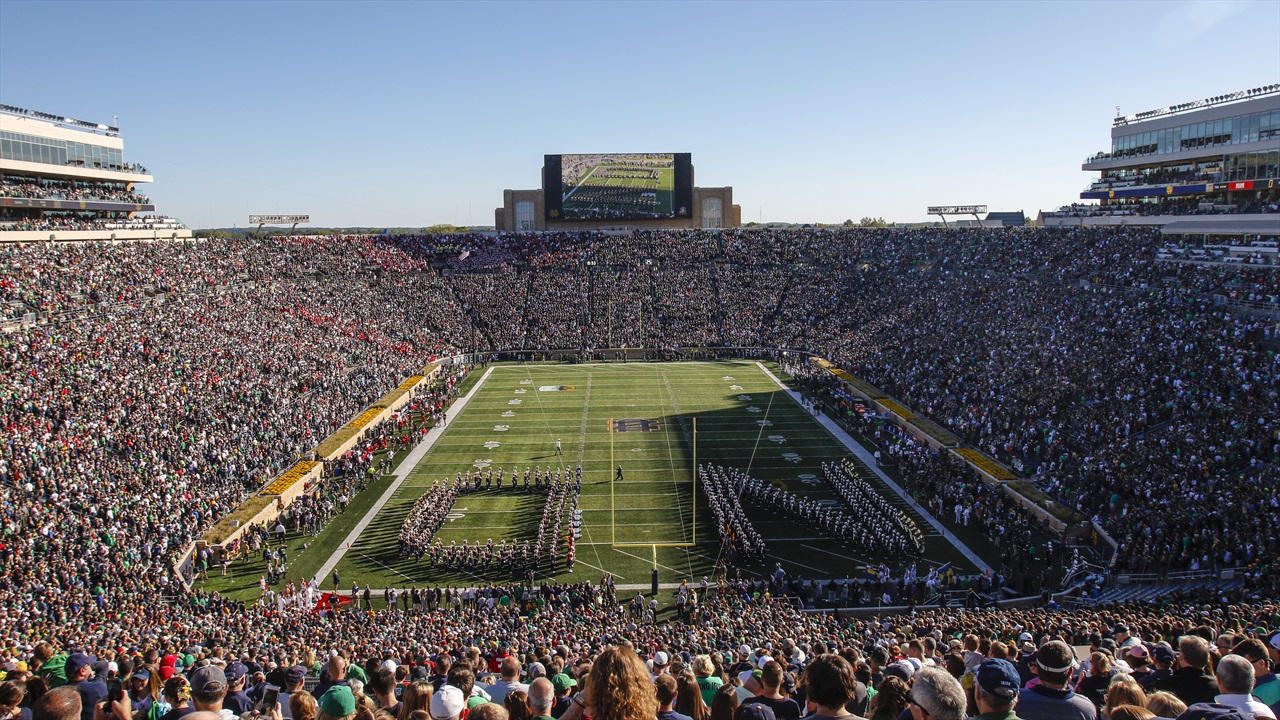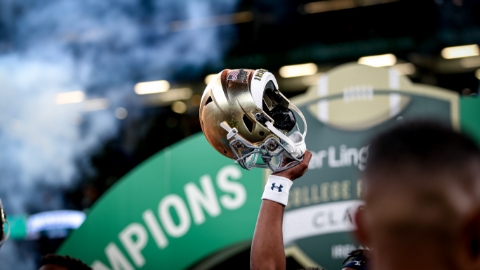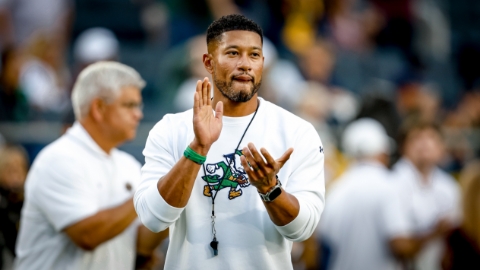
It all seems so unprecedented.
The empty classrooms. Vacant dorms. Sports in limbo.
The widespread quarantine and shelter-in-place orders from state leaders across the country, based on federal suggestions, due to the COVID-19 pandemic have left many feeling this is an unseen situation.
Yet, Notre Dame, among myriad others at the time, stared a similar situation, sans instant-information updates, more than 100 years ago during the Spanish Flu of 1918.
The similarity to the current state of affairs is striking; right down to the impact on sports.
Noted in a recent Notre Dame YouTube presentation, as well as with both research and a recent Notre Dame Magazine story by Margaret Fosmoe, the Notre Dame campus endured more than 200 cases of the Spanish Flu and endured nine campus deaths. In the school’s infancy of the 1840s, it also had dealt with the global outbreak of cholera, which school records indicated had been responsible for as many as 20 deaths.
The 1918 season at Notre Dame was Knute Rockne’s debut campaign as the head coach of the Fighting Irish.
It also was an abbreviated season due to the shutdowns that swept the nation amidst the Spanish Flu epidemic.
Rockne’s first season, coincident with the university opening its Graduate School, almost never happened.
“Coach Rockne was a very versatile, all-around person,” said Dr. Bernie Kish, the former Executive Director of the College Football Hall of Fame and currently a professor at the University of Kansas. “Rockne played football and ran track, was co-editor of the yearbook, played flute in the school orchestra and also made some money boxing.
“He really wanted to be a doctor, and got accepted into medical school in St. Louis and picked up a job coaching.”
Rockne also listened to a pitch from his mentor, then-Irish coach Jesse Harper.
“Harper told Rockne to come back to South Bend and he would hire him as assistant football coach and head track coach,” Kish said. “So from 1914 to 1918 he was assistant coach for Coach Harper, and in this timeframe, around 1917 to 1918, Coach Harper had married a girl whose parents lived in Kansas, near Sitka, Kansas, and west of Wichita.
“His father-in-law was at that point in time unable to run his ranch by himself, and he asked Jess if he would come back and help run the place, which he agreed to do. So that is why he resigned as coach at Notre Dame. He definitely wanted Rockne to be his replacement and talked to (school president) Father John Cavanaugh about Rockne being his replacement. The good father was a little bit reluctant about that and would bring up other names, and Coach Harper would always say, ‘Well, he’s not as good as Rockne.’”
Rockne, of course, was placed in charge of the program, and the transition “was a pretty smooth one,” Kish said, until the Spanish Flu wholly disrupted that ’18 campaign.
Franklin Carson, who served as South Bend Mayor from January 1918 through January 1922, had banned all public gatherings by fall of his inaugural year in office, according to documents.
Because of that edict and the relative lack of reliable, widespread dispersement of information, the Great Lakes Naval Academy team showed up at Notre Dame’s Carter Field to play the Fighting Irish in October of that year. But Notre Dame had cancelled all of its October football contests, and the teams player later in November, when they battled to a 7-7 tie.
That Great Lakes squad finished the season undefeated – 7-0-2 – and won the Rose Bowl.
“The research I did do, first of all, if you look at the schedule, Notre Dame played a game in September and no games in October, I am sure because of the flu,” Kish said. “They finished out the season playing five games in November.
“In looking at his roster, Rockne inherited from Coach Harper a really strong team. My guess was that Rockne was part of the recruiting effort to get those people to come to Notre Dame. George Gipp was a sophomore, so that was his first year. Hunk Anderson was there, who coached the 1931 season and a couple more after Coach Rockne was killed in the plane crash. Curly Lambeau was on that team. He really had a talented group of people.
“They tied Great Lakes and lost to Michigan State, which then was Michigan Agricultural College.”
Rockne finished that first season 3-1-2, the final five games played in a 26-day span from November 2-28. While Notre Dame was forced to shut down classes for a period in October 2018, according to an online archive of the South Bend News-Times, the community also endured the death of Arthur Harold Studebaker, just 35 years old and offspring of the renowned South Bend family, to Spanish Flu on Oct. 18, 1918.
“Rockne was a very astute guy,” said Kish, with a History and Tradition of Kansas Athletics course among his current duties at the school. “He was highly respected by other coaches, from his first season through his last season in 1930. He very close with Pop Warner.
“Grantland Rice said, “At any gathering, wherever ‘Rock’ sat, that was the head of the table. That kind of expressed the respect he had.”


